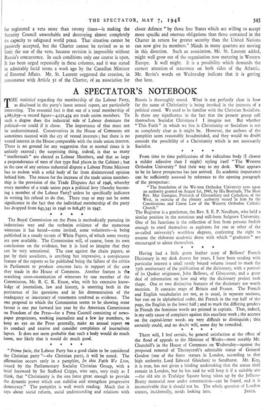The Royal Commission on the Press is methodically pursuing its
industrious way and the verbatim evidence of the numerous witnesses it has heard—some invited, some volunteers—is being published in a steady stream of White Papers, of which some twenty are now available. The Commission will, of course, form its own conclusions on the evidence, but it is hard to imagine that they can be very sensational. The case against the chain papers, as put by their assailants, is anything but impressive, a conspicuous feature of the reports so far published being the failure of the critics in Parliament to produce concrete facts in support of the case they made in the House of Commons. Another feature is the searching cross-examination of witnesses by one member of the Commission, Mr. R. C. K. Ensor, who, with his extensive know- ledge of journalism, law and history, is unerring both in the pertinence of his questions and in his demonstration of the inadequacy or inaccuracy of statements tendered as evidence. The one proposal to which the Commission seems to be showing some favour is one put forward last year by the American Commission on Freedom of the Press—for a Press Council consisting of news- paper proprietors, working journalists and a few lay members, to keep an eye on the Press generally, make an annual report on its conduct and receive and consider complaints of journalistic lapses. It does not seem probable that such a body would do much harm, nor likely that it would do much good.
* * * *


































 Previous page
Previous page